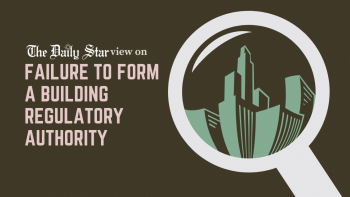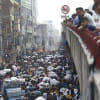Of mortality and unlearnt lessons: A follow-up

Four years and almost a month ago, I wrote about a fire in Dhaka's Chawkbazar area that broke out and claimed 80 lives on February 20, 2019. After all these years, today, it seems that nothing has changed.
There have been a number of incidents of fires and explosions in March alone, within Dhaka. One happened in a commercial building in the city's Science Lab area because of an air-conditioning unit exploding (claiming six lives), one was a fire incident in Tejgaon Kunipara slum (no lives lost, but hundreds of shanties destroyed), and one was the blast in Siddikbazar, Gulistan, which has claimed at least 23 lives so far, etc, as per several news sources.
As of writing this article on April 4 morning (Bangladesh time), another major fire broke out at Bangabazar Shopping Complex in Dhaka. Several local and international news sources, including The Guardian, have cited that about 600 firefighters and an air force helicopter were dispatched to exhaust the massive blaze, which came under control at around 12:36pm after more than six hours. The fire gutted nearly every shop in the beloved shopping complex among Dhaka residents for the multitude of thrift clothing shops. So far, no casualties have been reported, but hundreds of shopkeepers have suffered a loss of goods and assets collectively worth more than Tk 1,000 crore, according to sources. As of 2pm on April 4, the cause of the fire is unknown.
Despite all the madness and losses that ensue from Dhaka's poor urban planning, it is rather heartbreaking to see hardly any progress being made when it comes to maintaining any safety precautions in the city. Greedy businesses and superficial supervision from authority bodies like Rajdhani Unnayan Kartripakkha (Rajuk) have cost us innumerable lives, as well as crores of taka in terms of property loss and damage of assets.
Condolences and promises to pay for the lost lives will not bring the deceased back. Their lives were already tragically cut short due to shameless neglect.
Amongst the poor upkeep of safety codes of buildings, there have been reports of the firefighting teams being greatly overwhelmed, thanks to a lack of equipment, understaffed teams, roads too narrow for fire trucks to get through, and congested traffic with no emergency lanes for vehicles like ambulances and fire trucks. Some areas such as Gulshan and Banani do not even have fire stations!
I am no expert in urban planning. But it does not take an expert to identify the glaring issues that are laid out in the open for anyone to notice when it comes to Dhaka's urban planning. There is a reason why Dhaka is identified as the seventh least liveable city in the world in the Global Liveability Index 2022. Of course, poor urban planning is only one of the issues among road accidents, traffic congestion, rising costs of living, etc. But that is beside the point.
It is even worse when we think of the living conditions of slum residents. Living in squalor with barely any income to live by, along with the rising prices of necessary commodities, they have become an everyday statistic of people being displaced or killed in uncontrollable slum fires. A single spark is often enough to set an entire slum of hundreds of shanties up in flames.

A lot has happened since the article I wrote back in 2019, yet none of the changes I had hoped to see have taken place. The entirety of Bangladesh has seen an exact reported number of 24,102 fire incidents in the year 2022 alone – incidents that claimed 98 lives, 13 of whom were firefighters, according to this daily. Officials state that the number of lives lost might be higher, as the deaths of victims in hospitals were not counted. The number of fire incidents was 24,074 in 2019, according to the same source.
I remember asking why it is that we only tend to learn our lesson after lives are lost. But at this point, even after the loss of hundreds of lives, thousands of livelihoods, and hundreds of crores of taka in damage of assets and properties, we still seem to have learnt nothing at all.
I feel no optimism anymore when it comes to writing about the state we are in right now. While searching for the number of fires Bangladesh has had, I learnt that nearly 14 percent of the 24,102 fire incidents in 2022 started from something as trivial as a cigarette butt being thrown in the wrong place. It really begs the question: is it really that difficult to fool-proof fire breakouts? And how neglectful are we ourselves when it comes to our own safety?
Fires, industrial machinery malfunctioning horribly, whole buildings collapsing, little or no possibility of emergency services being able to reach areas thanks to our bad infrastructure, poor or non-existent safety procedures and equipment, shaky and unsafe buildings, poorly planned utilisation of floor plans in commercial buildings, usage of industrial machinery in buildings that were not meant to withstand them, and so on. The list of hazards does not seem to end. It seems that living, commuting or working in Dhaka is a hazard itself.
Condolences and promises to pay for the lost lives will not bring the deceased back. Their lives were already tragically cut short due to shameless neglect. We clearly are not learning from the death tolls, nor from the loss of livelihoods of hundreds of thousands of people. So what will it take for us to wake up? What could be worse than the deaths of fellow humans that will finally make us say "enough is enough" – enough to bring drastic changes in our urban planning and safety codes that can lead to saving all our lives? I guess "time will tell" is all we can really say.
Araf Momen Aka is a contributor to The Daily Star.

 For all latest news, follow The Daily Star's Google News channel.
For all latest news, follow The Daily Star's Google News channel. 










Comments